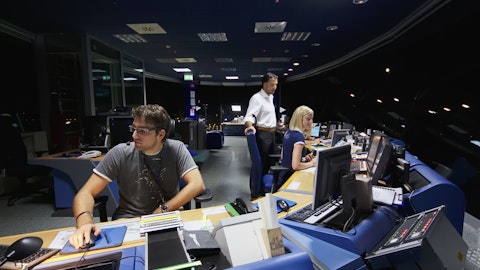So I want to be very, very clear about that. But anyway, I think your bigger — the other part of your question is, do you expect to see some kind of a step up in your rate of growth in FY ’25? And again, we’ll go through our guidance on our next call. But overall, we feel very optimistic about our fourth quarter and first quarter bookings, which should set us up for some kind of a step up year-over-year in terms of our annual growth rate.
Jeff Van Sinderen: Okay, great. That’s really helpful. Appreciate you taking all my questions. I’ll take the rest offline. Thanks.
Joe Bergera: Thanks, Jeff.
Operator: Thank you. The next question is coming from Mike Latimore from Northland Capital Markets. Mike, your line is live.
Mike Latimore: All right. Thanks. Yes. Good to see the strong profits here. I guess on the fourth quarter bookings, it sounds like you’re expecting strong bookings there. If this $10 million deal ends up in the first quarter, will you still see strong sequential booking?
Joe Bergera: Yes, we would expect to have strong bookings in the fourth quarter, regardless.
Mike Latimore: Okay.
Joe Bergera: And to be clear, it wasn’t only that one order that slipped from the third quarter into the fourth quarter. There were actually a handful of relatively large ones. That particular one is not only large, but we wanted to offer that additional commentary, because it’s very clear that we’d expected originally to receive that order in December 31 period, and subsequently, we got the notice of intent to award even just last week. So I just thought it was a very specific thing that we could reference to help people understand how some of these things tend to slip even a few weeks makes a big difference. But again, I want to be clear that was not the only order that pushed from the third quarter into the fourth.
Mike Latimore: Yes. Got it. The pipeline sounds strong. I don’t have a number from last year. Do you know, like, is that up materially from last year, that $650 million pipeline?
Joe Bergera: Yes, it’d be up substantially.
Mike Latimore: Okay. And then on the service attach rate on the sensor deals, how is that trending? What are you seeing there?
Joe Bergera: Yes, it continues to be really strong. I don’t have that number at hand. I’ll be happy to get it to you following the call. But my expectation is that it would be consistent with what we’ve been experiencing in the last couple quarters, which has been in the 20% to 30% range.
Mike Latimore: Yes. And then is the labor availability — is labor availability loosening generally? It sounds like you guys are at least being able to hire internally, but what about just kind of among your subcontractors and customers and so on?
Joe Bergera: Yes, that’s a good question. So, as I talked about on our last call, our impression is a generally the labor market does seem to be loosening. We had for some period of time had a very difficult time hiring like software developers, for example. There have been a lot of publicized stories about big tech and small and medium-sized technology companies. In some cases, some reorganization, which has resulted in some job elimination, and also just kind of reducing their hiring plans. And that’s certainly benefited us. We’ve definitely seen the availability of that kind of talent improve. The area where things still remain tight is traffic engineers, which is something we’ve talked about previously. And if you look at the US DOT’s research, there’s still no particular shortage of talent broadly in the transportation market, and then more specifically with respect to traffic engineers and civil engineers, because we’re just simply not seeing as many people graduating from those programs today as we did five and 10 and 15 years ago.
So, you have more people, you know, competing for a relatively small pool. But one of the things that we’ve introduced, we talked about on a prior call, was its various activities to try to source that kind of talent from international markets. And we’re definitely finding that to be successful. And as I mentioned, I didn’t go into a lot of detail, but we did see an improvement in our labor capacity in the December 31 period. And we have a very healthy pipeline of applicants with, you know, we have obviously internal expectations in terms of how many of those we’re going to be able to convert to new employees. And so our expectation is we’ll continue to see an improvement in our labor capacity in our fourth and our first quarter and even beyond.
So, to answer your question, in some respects, we see the market loosening. In other respects, we actually just think it’s, you know, certain tactics that we’ve undertaken are starting to bear fruit and that’s improving our position, even though I do think that the availability of traffic engineering talent in particular remains very tight.
Mike Latimore: Okay. Makes sense. Thanks very much.
Operator: Thank you. [Operator Instructions] And the next question is coming from Ryan Sigdahl from Craig Holland Capital Group. Ryan, your line is live.
Ryan Sigdahl: Hey guys, good afternoon. Not to beat a dead horse here, but on the deferrals with the bookings, I guess, what’s the underlying reasons for the delays? Because I just went back many, many years and kind of skipped COVID years, but it seems like there’s always kind of some that slips, some that come in, and it’s usually pretty consistent from a booking standpoint quarter-to-quarter. So I guess here’s the underlying reasons. And then second to that, any impact from kind of uncertainty with federal government funding bill and getting the stopgap, but not, not a real permanent one yet?




